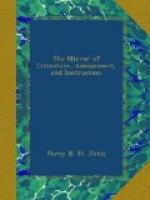All the splendour of the Arabian Nights is realized in the Court of Egypt. The guard of Nubian eunuchs with their black glossy countenances, clothed in scarlet and gold, waving their glittering Damascus sabres, and gently bounding on their snow-white steeds, is, perhaps, the most picturesque corps in the world. The numerous Harem, the crowds of civil functionaries and military and naval officers in their embroidered Nizam uniforms, the vast number of pages and pipe-bearers, and other inferior but richly attired attendants, the splendid military music, for which Mehemet Ali has an absolute passion, the beautiful Arabian horses and high-bred dromedaries, altogether form a blending of splendour and luxury which easily recall the golden days of Bagdad and its romantic Caliph.
Yet this Court is never seen to greater advantage than in the delicious summer palace in the gardens of Shubra. During the festival of the Bairam, the Pasha generally holds his state in this enchanted spot, nor is it easy to forget that strange and brilliant scene. The banqueting-rooms were all open and illuminated, the colonnade full of guests in gorgeous groups, some standing and conversing, some seated on small Persian carpets smoking pipes beyond all price, and some young grandees lounging in their crimson shawls and scarlet vests over the white balustrade, and flinging their glowing shadow over the moonlit water: from every quarter bursts of melody, and each moment the river breeze brought gusts of perfume on its odorous wings.
New Monthly Magazine.
* * * * *
NOTES OF A READER.
* * * * *
SPANISH SUPERSTITION.
We find this spice of the Wonderful in the Cabinet Cyclopaedia, History of Spain and Portugal.
“The character of Alfonso must be sufficiently apparent from his actions. It may be added, that his acquirements were of a very superior order. The Astronomical Tables which he composed, and which are called by his name, have been often adduced as proofs of his science. It is, however, certain, that in their construction he was greatly indebted to the Moorish astronomers of Granada, some of whom visited his court for the express purpose of superintending, if not of calculating them. That he had a hand in the composition of the Chronicle which also bears his name, is no less undoubted; but we should vainly attempt to ascertain the portion issuing from his




